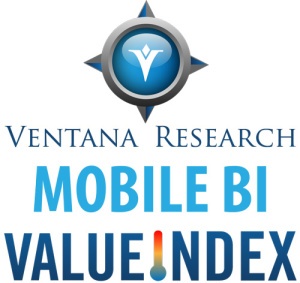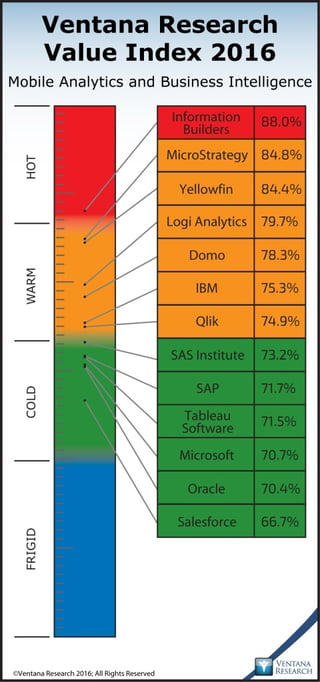Ventana Research has newly published its Mobile Analytics and Business Intelligence 2016 Value Index. The Value Index provides a comprehensive evaluation of vendors and their product offerings across seven categories. In performing that analysis, I realized that this software category is at a crossroads. Once an optional capability often reserved for executives, mobile analytics is becoming a requirement of business users across organizations. The blurring of lines between work and personal lives has provoked a change from single device BI to BI on multiple devices including smartphones and tablets as well as laptops and desktops. From a platform standpoint, the adoption of HTML5 is contesting the prevalence of native mobile applications.
In preparing the product evaluations for this 2016 Mobile Analytics and BI Value Index, we relied on the extensive findings of several of  our benchmark research projects: Data and Analytics in the Cloud, Big Data Analytics and Information Optimization. That body of research examines organizations’ current and planned use of business intelligence and the capabilities they require for successful deployment. In doing so it uncovered widespread use of mobile business intelligence. More than four out of five (82%) organizations in our data and analytics in the cloud research said they access analytics and BI via mobile technology. This is the case across organizations of all sizes, annual revenue, industry segments and geography. The research also shows strong support from senior management: More than two-thirds (69%) of executives said that providing mobile access is important.
our benchmark research projects: Data and Analytics in the Cloud, Big Data Analytics and Information Optimization. That body of research examines organizations’ current and planned use of business intelligence and the capabilities they require for successful deployment. In doing so it uncovered widespread use of mobile business intelligence. More than four out of five (82%) organizations in our data and analytics in the cloud research said they access analytics and BI via mobile technology. This is the case across organizations of all sizes, annual revenue, industry segments and geography. The research also shows strong support from senior management: More than two-thirds (69%) of executives said that providing mobile access is important.
We considered easy access and use to be important in this Value Index analysis because in all three research projects the largest percentage of organizations identified usability as an important evaluation criterion for mobile business intelligence applications. This finding echoes an emphasis on the importance of usability that we regularly find in our research. In the case of mobile business intelligence, it also may be reinforced by the recent transition to a second generation of BI on mobile devices that features a richer user interface and a broader set of gestures. It is clear that today’s mobile workforce wants to be able to access and analyze data simply and straightforwardly through a familiar and intuitive interface regardless of whether they are using their smartphones, tablets or personal computers.
The current environment of mobile device platforms, in which Apple, Google and Microsoft each has its own operating system and default Web browser, provides the backdrop for an ongoing three-way debate that pits native mobile BI applications against browser-based and hybrid applications. Each has pluses and minuses. Native applications interact with the underlying operating system and so can provide support for operating system-resident features such as multitouch gestures, double-tapping and pin-and-stretch. A purely Web-based application, generally using HTML5, which our information optimization research finds is the second-most widely used technology standard for information (by 54% of organizations), enables developers to deliver rich user interface experiences to mobile device screens independent of the underlying operating system. The third approach is a compromise, developing a hybrid application using tools that wrap the HTML5 code in a native application container. This approach draws advantages from both of the others since it can enable users to take advantage of native device functions such as a camera while using a single code base to support the application. The Value Index analysis found several vendors in the midst of a change between these approaches; some are embracing HTML5 and a hybrid architecture while others have made bigger investments in native applications.
This 2016 Mobile Analytics and BI Value  Index report evaluates 13 vendors that offer products that address key elements of mobile analytics and business intelligence as we define it: Domo, IBM, Information Builders, Logi Analytics, Microsoft, MicroStrategy, Oracle, Qlik, Salesforce, SAP, SAS Institute, Tableau Software and Yellowfin. The chart included here presents the overall ranking of the vendors, their scores and their ratings as Hot, Warm or Cold.
Index report evaluates 13 vendors that offer products that address key elements of mobile analytics and business intelligence as we define it: Domo, IBM, Information Builders, Logi Analytics, Microsoft, MicroStrategy, Oracle, Qlik, Salesforce, SAP, SAS Institute, Tableau Software and Yellowfin. The chart included here presents the overall ranking of the vendors, their scores and their ratings as Hot, Warm or Cold.
We urge organizations to do a thorough job of evaluating mobile analytics and business intelligence systems and tools and dig deeper than just the overall rankings. We offer this Value Index as both the results of our in-depth analysis of these vendors and as an evaluation methodology. The Value Index can be used to evaluate existing suppliers and also provides evaluation criteria for new projects. Applying it this way can shorten the RFP cycle time and enable your organization to optimize its mobile analytics and business intelligence efforts. Click on the link to learn more and receive a complimentary copy of the 2016 Value Index for Mobile Analytics and Business Intelligence market report.
Regards,
David Menninger
SVP & Research Director
Follow Me on Twitter @dmenningerVR and Connect with me on LinkedIn.


 our benchmark research projects:
our benchmark research projects: 









